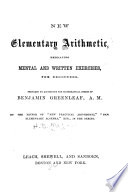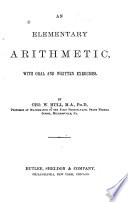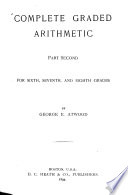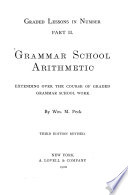 | Henry Bartlett Maglathlin - Arithmetic - 1893 - 234 pages
...denominator to the divisor. Thus, the quotient of 1 divided by 2 is i ; 3 divided by 4 is I ; and £ Is 2. 2. Dividing both terms of a fraction by the same number does not change its value. For it has been shown, that canceling equal factors in the dividend and divisor does not... | |
 | Education - 1893 - 726 pages
...unusual, is a striking exponent of things that are common to the experience of all. ARITHMETIC. 1. Dividing both terms of a fraction by the same number does not change its value. Explain the principle upon which this depends. 2. A man spent f of his money for provisions,... | |
 | Edward Brooks - Arithmetic - 1893 - 228 pages
...change its value. Hence we have the following PRINCIPLE V.—Multiplying both numerator and denominator of a fraction by the same number does not change the value of the fraction. 2 Multiply both numerator and denominator of f by 3; | by 6; * by 5; f by 3; JA by... | |
 | George Washington Hull - Arithmetic - 1894 - 204 pages
...may be done to the terms of a fraction without changing its value ? 49. Principle. — Multiplying or dividing both terms of a fraction by the same number does not change the value of the fraction. 7. How many halves in T\ ? T\? 8. How many thirds in f? T%? 9. How many fifths in... | |
 | George Edward Atwood - Arithmetic - 1894 - 396 pages
...4. Dividing the denominator by any number multiplies the fraction by that number. 5. Multiplying or dividing both terms of a fraction by the same number does not change the value of the fraction. 84. Reduction of Fractions is the process of changing their form without changing... | |
 | Oscar F. Williams - Arithmetic - 1894 - 332 pages
...denominator divides the fraction; dividing the denominator multiplies the fraction. 3. Multiplying or dividing both terms of a fraction by the same number does not change the value of the fraction. REDUCTION OF FRACTIONS. 171. To Reduce a Whole Number to a Fractional Form. EXAMPLE.... | |
 | Wm. M. Peck - 1894 - 310 pages
...fraction. n. Dividing the numerator or multiplying the denominator divides the fraction, in. Multiplying or dividing both terms of a fraction by the same number does not change its value. Reduce fff to its lowest terms. Since no common factor can readily be discovered, we find... | |
 | Albert Newton Raub - Arithmetic - 1894 - 200 pages
...to their lowest terms. 13. Reduce ^-f, f$, ^f to their lowest terms. PRINCIPLE. — The division of both terms of a fraction by the same number does not change its value. Thus, if both terms of the fraction Тв2, equal to ^, be divided by-6, the quotient is... | |
 | Education - 1913 - 608 pages
...Is -j^ more or less than f ? Does it divide the fraction to multiply the denominator? Multiplying or dividing both terms of a fraction by the same number does not change the value of the fraction. * + 2 Can you divide the numerator? What is the new numerator? What is the denominator?... | |
 | United States. Bureau of Naval Personnel - Arithmetic - 1913 - 144 pages
...result will be TV, in •& there are twice as many parts as in f, but they are only half as large. 6. Dividing both terms of a fraction by the same number does not change its value. Thus, if both terms of ^ be divided by 2, the result is f ; in f there are £ as many parts... | |
| |